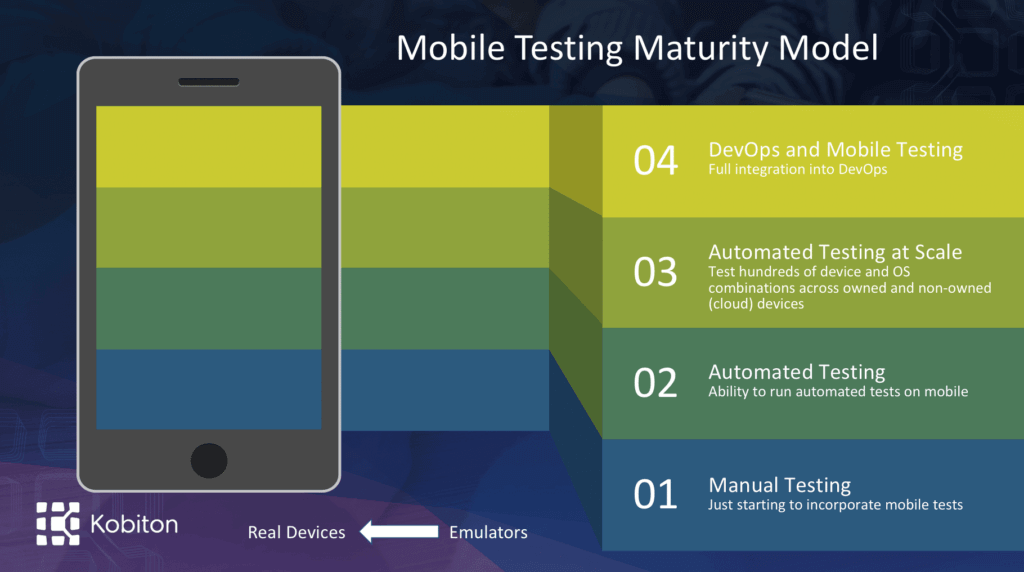
Mobile Testing Maturity Model

Adam Creamer
For a first-hand understanding of development industry trends, Kobiton routinely speaks with business leaders from around the world. And, what have we heard?
We know that application design and testing strategies continue to be impacted by innovative tools, specialized techniques, and marketplace demands. We also know that there has never been a better time to recognize the critical importance of mobile design testing — our increasingly connected world demands it.
To facilitate and advance that mobile development process, we developed the Kobiton Mobile Maturity Model framework to make navigating every stage of the testing strategy process easier than ever.
Mobile maturity refers to the level of sophistication and effectiveness in an organization’s mobile development and testing strategies. It encompasses the ability to identify gaps in current practices and provides a roadmap toward achieving excellence in mobile application delivery.
Components that contribute to an organization’s mobile operating maturity include:
The Kobiton Mobile Maturity Model assesses an organization’s practices in these areas, offering a comprehensive evaluation that includes UX performance, reliability, accessibility, and more. This model is designed to guide organizations in focusing and improving upon these aspects to enhance their overall mobile development, testing, and DevOps processes, ultimately leading them toward a state of mobile excellence.
Developed from Kobiton’s vast experience, the mobile maturity model offers a comprehensive evaluation of your organization’s current mobile development, testing, and DevOps practices. More than a simple assessment- the Kobiton Mobile Maturity model provides your development and testing teams with a detailed report that evaluates your UX, performance and reliability, accessibility, and more. Providing a clear action plan for your organization to focus on and improve on to guide your organization toward mobile excellence.
The model employs an online questionnaire to evaluate and quantify your organization’s mobile development and testing maturity, leveraging Kobiton’s proprietary data and industry benchmarks. This assessment provides a six-month action plan to prioritize improvements.
The benefits of undergoing a Mobile Maturity Model assessment have far-reaching impacts on an organization’s mobile application development and testing capabilities. By providing a detailed evaluation of current practices and offering a customized action plan for improvement, this assessment influences various aspects of an organization’s mobile strategy and operations. Organizations around the world can successfully use and implement our Kobiton Mobile Maturity Model assessment to improve not just mobile development, but established testing strategies and operating systems as well.
Here’s an explanation of the impact of these benefits:
The assessment helps align mobile development and testing efforts with the organization’s broader business objectives. By identifying areas for improvement and setting a clear roadmap, teams can focus their efforts on initiatives that contribute directly to business goals, such as improving customer experience or accelerating time to market.
Understanding the maturity of your mobile development and testing processes allows for targeted improvements in areas critical for product quality, such as UX, reliability, and accessibility. This focus on quality not only enhances user satisfaction but also reduces the cost associated with post-release fixes, leading to better reviews and higher retention rates.
By pinpointing inefficiencies and gaps in current development and testing practices, the assessment provides insights into how processes can be optimized. Implementing the suggested improvements can streamline workflows, enable faster feedback loops, and reduce time to market, giving organizations a competitive edge.
The roadmap for improvement often highlights ways to better utilize resources, automate repetitive tasks, and refine testing strategies. These optimizations can significantly reduce operational costs by minimizing manual labor, decreasing the need for extensive debugging, and lowering the risk of costly errors.
A mature mobile development and testing process includes robust mechanisms for identifying and addressing issues early. By advancing maturity, organizations can reduce the risk of major bugs or performance issues that affect user experience, safeguarding the brand’s reputation and user trust.
The assessment provides a wealth of data and insights into the current state of mobile maturity, enabling leaders to make informed decisions about where to invest in technology, training, or process changes. This data-driven approach ensures that resources are allocated effectively to areas with the highest potential for return on investment.
Engaging in a maturity model assessment and following its action plan instills a culture of continuous improvement within the organization. Regular reassessments and roadmap updates keep teams focused on evolving their capabilities, fostering a proactive stance towards innovation and excellence in mobile development.
Organizations that are aware of their maturity level and actively work to enhance their mobile development and testing practices are better positioned to respond to market demands, adopt new technologies, and deliver high-quality mobile experiences. This responsiveness and commitment to quality can differentiate an organization in the competitive landscape, attracting and retaining users.
Here are the steps to complete your mobile maturity assessment:
Every step of the way, a Kobiton professional will be standing by.
Mobile maturity can significantly affect a company’s approach to development, and it can help organizations better prepare for and position themselves for a changing technical landscape.
Understanding an organization’s mobile maturity is crucial for several reasons, as it directly impacts the organization’s ability to deliver high-quality mobile applications efficiently and effectively. This understanding can significantly influence the strategic direction, operational efficiency, and overall success of an organization’s mobile initiatives.
Below are key points highlighting the importance of understanding an organization’s mobile maturity:
Understanding an organization’s mobile maturity is fundamental to developing and executing a successful mobile strategy. It allows organizations to align their mobile efforts with business goals, optimize resources, improve application quality, manage risks effectively, and maintain a competitive edge in the rapidly evolving mobile landscape
Are you ready to evaluate your mobile excellence? You can bet competitors are. To learn more about the Kobiton Mobile Maturity Assessment click here; if you are a current customer you can take the Kobiton Mobile Maturity Assessment today.